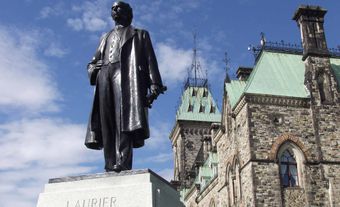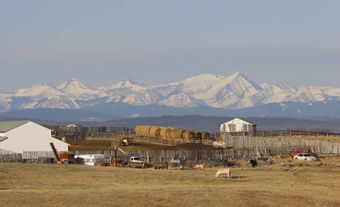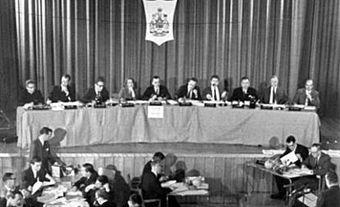The Law
This timeline includes moments related to law, crime and legal reform in Canada.
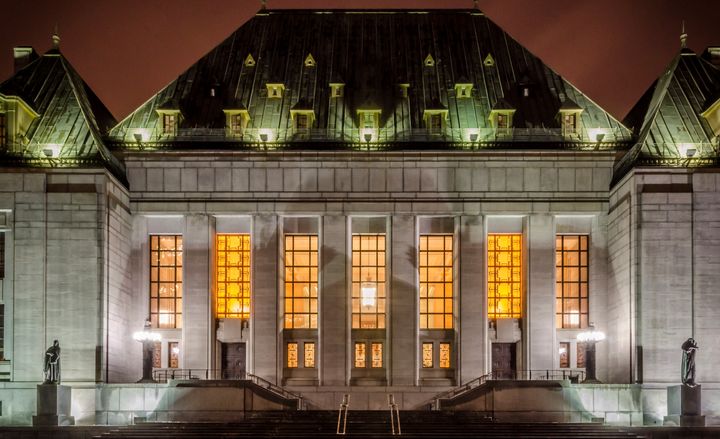
-
May 23, 1701
The Law
Captain Kidd Hanged
William "Captain" Kidd, the famous Scottish pirate, was hanged for piracy. His treasure is reputed to be buried on Oak Island, NS.
-
June 21, 1734

The Law
Angélique Tortured and Hanged
Marie-Joseph Angélique allegedly set fire to her master's Montréal house and destroyed nearly 50 homes. She was tortured and hanged as an object lesson for all Blacks.
-
April 18, 1763
The Law
Corriveau Hanged
Marie-Josephte Corriveau was hanged for the murder of her husband. She was initially convicted of being an accessory to her father, Joseph Corriveau, killing her husband, but when Joseph recanted his confession, Marie-Josephte was retried and admitted her crime during the second trial. Her execution gave rise to many myths and legends.
-
September 17, 1764
The Law
Civil Courts in Québec
Québec establishes a system of civil courts, ending the military rule that had been implemented since the Seven Years' War.
-
June 22, 1774
Legislation
Quebec Act Passed
The Quebec Act was passed (effective 1 May 1775); it established French civil law, British criminal law, freedom of worship for Roman Catholics and government by appointed council. It extended the boundaries of the province to the Ohio Valley.
-
June 02, 1779
The Law
Newspapermen Arrested
Newspapermen Fleury Mesplet and Valentin Jautard were arrested by order of the governor after criticizing a judge''s rulings in their paper Gazette Littéraire.
-
April 21, 1785
The Law
Trial by Jury
Trial by jury was first established in Canada.
-
July 09, 1793

Legislation
Slavery Act Passed
Governor John Graves Simcoe introduced the Act to Limit Slavery in Upper Canada, "an Act to prevent the further introduction of slaves, and to limit the term of contract for servitude within this province." It was the first step toward abolishing slavery in Upper Canada, and following its passage the country became a refuge for American slaves.
-
November 23, 1809
The Law
Pirate Executed
Edward Jordan was found guilty of murder and piracy and was hanged. His tarred and chained corpse was gibbeted at the entrance to Halifax harbour.
-
June 20, 1822
The Law
Law Society Founded
The Law Society of Upper Canada was incorporated.
-
June 05, 1832
The Law
Jews Receive Rights
A law giving Jews legal rights was passed in the Lower Canada Assembly. By 1768, the number of Jews in Montréal had grown, and the community established Canada's first synagogue, Shearith Israel. Jews had also settled in Québec City and other parts of Lower Canada. Ezekiel Hart had been elected to the legislature of Lower Canada in 1807 but was denied his seat on the basis of his religion.
-
August 01, 1834

Legislation
Abolition of Slavery Act
Black people are now considered British subjects, paving the way for property-owning Black men to vote. But racism and discrimination at polling stations mean many do not cast their ballots. (See Slavery Abolition Act, 1833.)
-
April 12, 1838
The Law
Lount and Matthews Hanged
Samuel Lount and Peter Matthews were hanged for treason, at Toronto, for their roles in the Rebellion of 1837.
-
May 22, 1838
The Law
Last Fatal Duel
In Verdun, Qué, lawyer Robert Sweeny shot and killed Maj Henry Warde, who had sent a love letter to Mrs Sweeny, in the last fatal duel recorded in Canada.
-
May 28, 1838
The Law
Outlaw Seizes Steamer
Outlaw William Johnston seized and burned the steamer Sir Robert Peel in the Thousand Islands, carrying off $175 000 in cash and plunder.
-
January 18, 1839
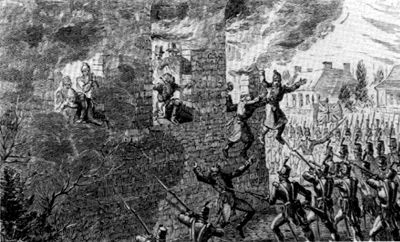
The Law
Rebels Hanged
Rebels were hanged at Montréal for their part in the Rebellions of 1837.
-
May 17, 1849
The Law
Sayer Trial
Pierre Guillaume Sayer and 3 other Métis in the Red River Colony were brought to trial on charges of violating the Hudson's Bay Company's charter by illegally trafficking in furs.
-
September 18, 1850
Legislation
The Fugitive Slave Act
The Fugitive Slave Act passed by the American Congress on 18 September 1850 dealt a severe blow to the American abolitionist cause. It gave slave-owners and their agents the right to track down and arrest fugitives anywhere in the country. Bounty hunters often kidnapped free Blacks and illegally sold them into slavery in the Southern states.
-
January 01, 1857
Indigenous Peoples Legislation
Gradual Civilization Act Passed in the Province of Canada
The government attempts to assimilate First Nations men by offering them the right to vote if they voluntarily enfranchise. This means giving up rights, including treaty rights. Only one person elects to do so under this Act. (See also Indigenous Peoples in Canadian Law.)
-
July 01, 1858

The Law
First Coins Minted
A law required that the accounts of the Province of Canada be kept in dollars; the first Canadian coins were minted: silver 5-cent, 10-cent and 20-cent pieces and bronze pennies.
-
June 08, 1859
The Law
Supreme Court of British Columbia Established
The Supreme Court of British Columbia was established.
-
December 02, 1859
The Law
John Brown is Hanged
The Harpers Ferry raid left a deep impression on Canadians. In the days and weeks that followed, many newspapers took note of John Brown's efforts, and some even proclaimed him a "hero." Funeral bells tolled in Toronto after Brown's 2 December 1859 execution and many churches held memorial services.
-
July 01, 1867
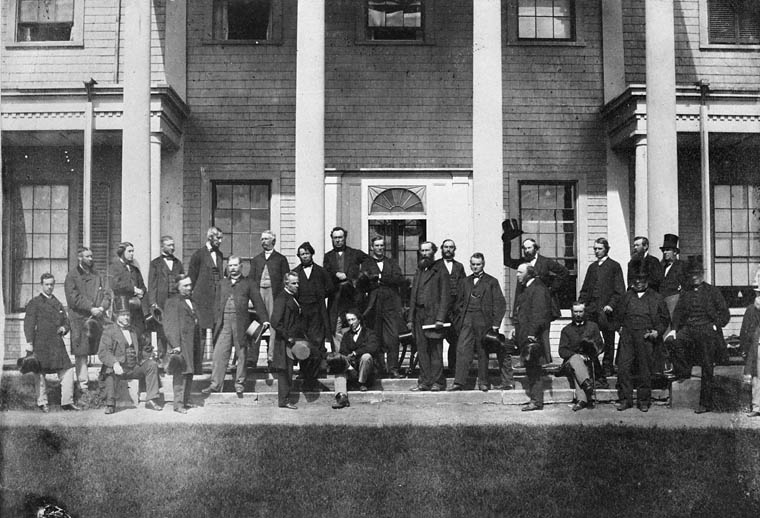
Legislation
BNA Act Protects Some Minority Religious Education Rights
The British North America Act of 1867 gave provinces authority over education with one significant exception: Section 93 of the Act protected the religious education rights of the Protestant minority in Quebec and the Roman Catholic minority in Ontario. In Quebec, a dual confessional school system, controlled by Protestants and Roman Catholics, became entrenched in law. Although Jews and members of other faiths could attend either Protestant or Catholic schools, they did not possess equal education rights.
-
February 11, 1869
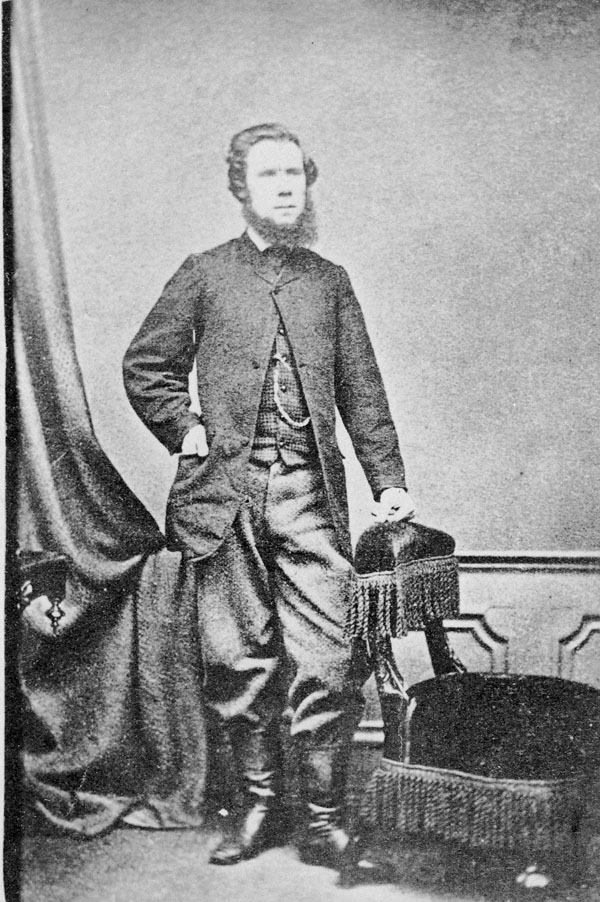
The Law
Whelan Hanged
Patrick James Whelan was hanged in Ottawa for murdering Thomas D'Arcy McGee. He was hanged in front of 5000 spectators in Ottawa, one of the last public executions in Canada.
-
May 01, 1872
Legislation
Chinese Canadians Banned from Voting in BC
The British Columbia legislative assembly passes a law banning Chinese Canadians from voting. Previously, Chinese Canadian men could vote in provincial elections.
-
May 23, 1873

The Law
North-West Mounted Police
An Act of Parliament authorized the creation of the North-West Mounted Police; the prefix Royal was added 1904.
-
April 08, 1875
The Law
Supreme Court Organized
An Act of the Canadian Parliament created the Supreme Court of Canada. The court sat for the first time on January 17, 1876.
-
January 17, 1876

Supreme Court of Canada
Supreme Court of Canada Sits for the First Time
Following its creation by the Supreme and Exchequer Court Act the year before, the Supreme Court of Canada sat for the first time. It would not hear its first case, however, until April 1876.
-
April 12, 1876

Indigenous Peoples Legislation
Indian Act
The Indian Act is introduced. The Act aims to eradicate First Nations culture in favour of assimilation into Euro-Canadian society. The Act also reinforces that Status Indians must voluntarily give up status and treaty rights to vote federally. Status Indian women are barred from voting in band council elections.
-
February 04, 1880
The Law
Donnelly Massacre
Five members of the Donnelly family were massacred near Lucan, Ont.
-
January 01, 1885
Legislation
Electoral Franchise Act
The original draft of the Act gave federal voting rights to some women, but under the final legislation, only men can vote. The Act gives some Reserve First Nations with property qualifications the right to vote, but bars Chinese Canadians.
-
November 16, 1885

The Law
Louis Riel Hanged
Louis Riel was hanged for treason at the Regina jail. He had been convicted after a trial held in Regina from 28 July to 1 August. Macdonald's refusal to grant leniency made Riel a symbol of English-Canadian oppression.
-
January 01, 1889

Indigenous Peoples
Peasant Farm Policy Introduced
From 1889 to 1897, the Canadian government’s Peasant Farm Policy set limits on Indigenous agriculture on the Prairies. The policy included rules about the types of tools First Nations farmers could use on reserve lands. It also restricted how much they grew and what they could sell. The policy impeded the growth and development of First Nations farms and reduced their ability to compete with settler farms on the open market.
-
March 06, 1889
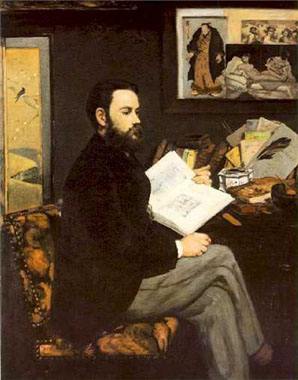
The Law
Zola Censored
A Toronto customs officer destroyed the novels of Émile Zola for being obscene.
-
March 25, 1893
The Law
Driving a Lady on Sunday
A Toronto magistrate fined a cab driver $2 or 10 days in jail for "driving a lady on a Sunday."
-
January 01, 1895
Legislation
Japanese Canadians Lose the Right to Vote in BC
British Columbia amends the Provincial Voters’ Act to remove the right to vote from Japanese Canadians.
-
February 02, 1897

The Law
First Woman Lawyer
The Law Society of Upper Canada changed its regulations, allowing Clara Brett Martin to become the first woman admitted to the profession of law in the British Empire.
-
May 06, 1898
The Law
Yukon Field Force
The Yukon Field Force, consisting of 203 volunteers, left Vancouver for Dawson to maintain order during the Klondike Gold Rush.
-
June 13, 1898
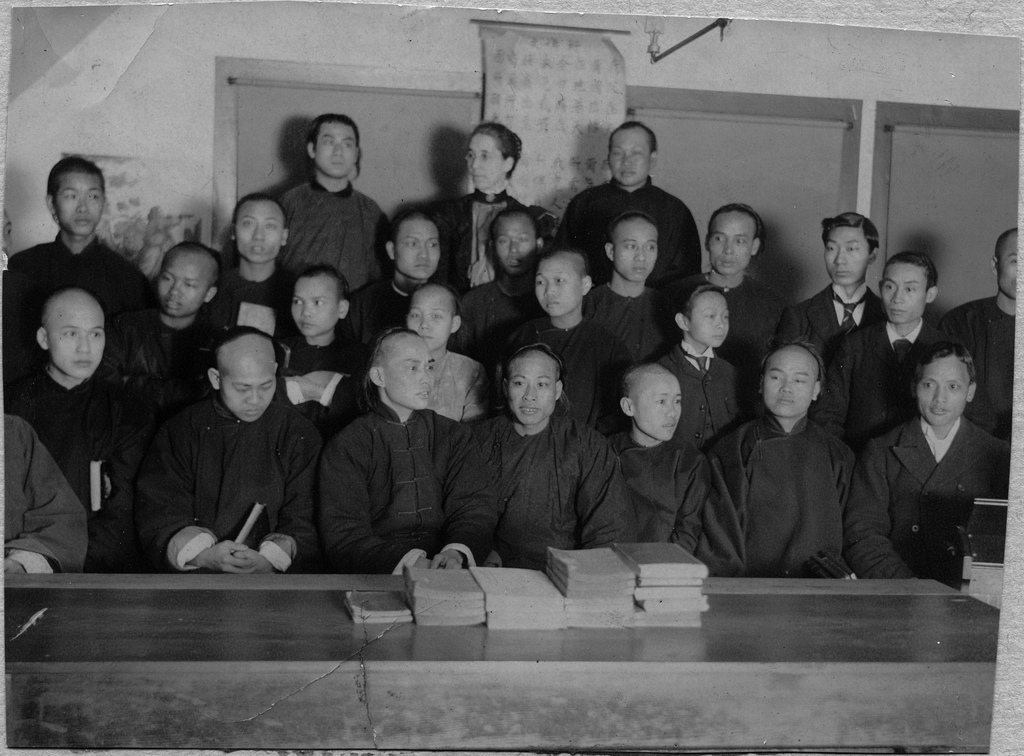
Legislation
Federal Government Returns Determination of Voters to Provinces
Provinces are given the right to decide who can vote in provincial elections. Some exclude Chinese Canadians from voting provincially. However, federal legislation allows Chinese Canadians to vote in federal elections.
-
January 01, 1903

High-Profile Cases Legislation
Pinsler Case and Education Act, 1903
After a Protestant school board refused to honour a scholarship won by Jacob Pinsler, the son of Jewish immigrants, the Pinslers sued. However, the Quebec Superior Court upheld the board’s position because only Protestants and Roman Catholics had constitutional education guarantees. Fallout from the Pinsler case led to the adoption of the Education Act in 1903. It stipulated that Jews would be considered Protestants for educational purposes, and the Protestant board would receive funding based on enrolment. Nevertheless, problems persisted and dissatisfaction on all sides increased. (See also Jewish School Question.)
-
April 25, 1903
The Law
Jewish Education Rights (Québec)
The Québec legislature adopted legislation requiring Jews to pay their taxes to the Protestant schools panel and granting them education rights equal to those of Protestants. In 1928, the Privy Council ruled that the 1903 Act was ultra vires (beyond legal authority).
-
May 08, 1906

The Law
Train Robber Captured
Bill Miner stuck up a CPR train near Kamloops, but the robbery was bungled. Miner and 2 accomplices were captured by the Royal North-West Mounted Police.
-
July 11, 1906
Legislation
Lord's Day Act Passed
The Lord's Day Act, officially making Sunday a day of rest in Canada, was passed into law by the Senate. The Act restricted trade, labour and recreation on Sundays.
-
January 01, 1907
Legislation
BC Provincial Elections Act Amendment Act, 1907
British Columbia removes voting rights from anyone with origins in South Asia.
-
July 31, 1910
The Law
Crippen Caught by Radio
Dr Crippen was arrested aboard the SS Montrose as it was docking at Québec. Charged with the murder of his wife in England, he was the first criminal to be caught by the use of radio.
-
October 10, 1911
The Law
BC Courthouse Opens
The BC provincial courthouse opened in Vancouver on Georgia Street in an impressive building designed by Francis Rattenbury.
-
November 05, 1914
The Law
Cattle Grazing Granville Street
The Vancouver police were notified that a large number of cattle were at large on Granville Street. The police rounded up and impounded 97 head of cattle, which were later redeemed by the Swift Canadian Co. for a fee of $97.
-
January 28, 1916
Legislation
Manitoba Women Win Right to Vote
Women in Manitoba who are of British descent or citizenship, 21 or older, and not otherwise disqualified are given the right to vote provincially and to hold provincial office. Other provinces soon follow and grant women the right to vote in provincial elections.
-
September 20, 1917
.png)
Legislation
Wartime Elections Act and Military Voters Act
Parliament passes the Wartime Elections Act. The right to vote federally now extends to women in the armed forces and female relatives of military men. However, Citizens considered of “enemy alien” birth and some pacifist communities are disenfranchised.
-
May 24, 1918
Indigenous Peoples Legislation
Women Granted Right to Vote in Federal Elections
Many Canadian women are granted the right to vote in federal elections, but First Nations women can only vote if they give up their status and treaty rights.
-
July 27, 1918
The Law
Albert Goodwin Shot
Labour organizer and draft resister Albert "Ginger" Goodwin was shot by police outside Cumberland, BC. On August 2, the day of his funeral, union members in Vancouver started a 24-hour strike and fought with returning servicemen.
-
February 01, 1920

The Law
Royal Canadian Mounted Police
The Royal North-West Mounted Police became the Royal Canadian Mounted Police after merging with the Dominion Police. RCMP headquarters was moved from Regina to Ottawa.
-
March 01, 1920
The Law
Alberta Penitentiary Closes
The federal government ordered the Alberta Penitentiary in Edmonton closed down and the 147 prisoners moved to Prince Albert, Saskatchewan or Stony Mountain, Manitoba.
-
April 21, 1920
The Law
Houde Murder Trial
The murder trial of Marie-Anne Houde ended. Houde was accused of murdering her step-daughter, Aurore, who became a martyr in the collective consciousness. Houde's defence was insanity exacerbated by pregnancy. Initially she was sentenced to be hanged but her sentence was changed to life imprisonment due to pressure from the citizenry and militant groups.
-
July 01, 1920
Legislation
Dominion Elections Act
The Dominion Elections Act enfranchised many of those who had been disenfranchised during the First World War, such as those originating from countries with which Canada had been at war. However, the Act stated that anyone who was disenfranchised by provincial legislation because of race would remain disenfranchised from the federal vote. This included persons of Chinese origin in Saskatchewan, and those of Indigenous, Chinese, Japanese, and South Asian origins in British Columbia.
-
January 10, 1924
The Law
Pérodeau Appointed Lieutenant-Governor
The Honourable Narcisse Pérodeau was appointed Québec''s 14th lieutenant-governor, serving until 10 January 1929.
-
November 30, 1924

High-Profile Cases Legislation
Taschereau’s Special Commission on Education
In 1924, Quebec Premier Louis-Alexandre Taschereau established a Special Commission on Education to examine the case of Jewish students in Quebec’s public school system. After the commissioners remained at an impasse, Taschereau referred the 1903 Act to the Quebec Court of Appeal. It concluded that the Act violated section 93 of the BNA Act and was therefore invalid. Jews had no legal rights to attend Protestant schools, teach or serve as commissioners. The court also ruled that the Quebec government did not have the authority to set up separate schools. The government appealed the decision to the Supreme Court of Canada. In 1926, it upheld the appeal court rulings but concluded that the provincial government had the right to establish separate schools. In 1928, the case was referred to the Judicial Committee of the Privy Council in Britain, which agreed with the Supreme Court. (See also Jewish School Question.)
-
December 10, 1927
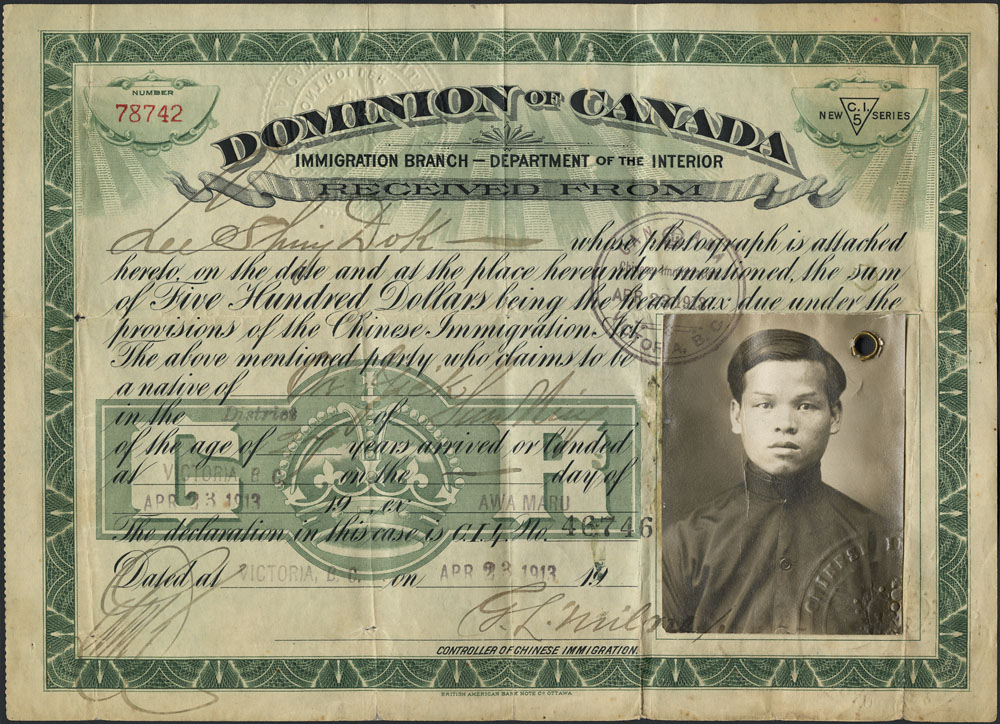
People
Birth of Margaret Jean Gee
Margaret Jean Gee was born in Vancouver, BC. In 1953, she became the first woman of Chinese descent to graduate in law at the University of British Columbia. The following year, she became the first Chinese Canadian woman in British Columbia to be called to the bar.
-
April 24, 1928
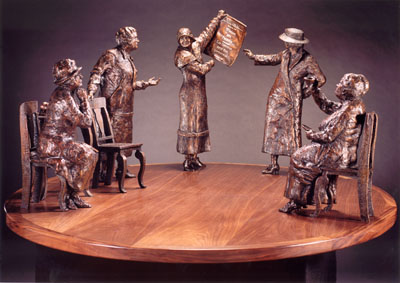
The Law
Persons Case
In the Persons Case, the Supreme Court of Canada unanimously decided women were not "persons" who could hold public office as Canadian senators. In 1929 the British Privy Council reversed the decision.
-
April 01, 1930

High-Profile Cases Legislation
The David Bill is Enacted in Quebec
In April 1930, the Liberal government of Premier Louis-Alexandre Taschereau passed a law to create a Jewish school board in Quebec. Under the statute, government-appointed Jewish commissioners were legally required to continue negotiations with the Protestant and Catholic school boards. However, the commissioners obtained few concessions other than an end to segregation. Discriminatory practices in hiring and religious education continued, as did taxation without representation. Opposition to the David Bill — named after Provincial Secretary Athanase David — erupted. Support within the Jewish community was split. The Roman Catholic Church denounced the Bill and French-Canadian nationalists protested. The Bill was repealed in 1931. (See also Jewish School Question.)
-
February 17, 1932
The Law
Mad Trapper Shot
Albert Johnson, the "Mad Trapper," was shot and killed by the RCMP on the Rat River, northern Yukon Territory.
-
January 01, 1934
Indigenous Peoples Legislation
Dominion Franchise Act
Inuit and First Nations persons living on reserves are disqualified from voting in federal elections, except for First Nations veterans who had previously received the vote.
-
June 21, 1940
Legislation
Conscription Act Passed
Parliament passed the National Resources Mobilization Act, providing for the conscription of able-bodied men for home defence. It was amended in 1942 by Bill 80, giving the government power to conscript for overseas service.
-
August 05, 1940
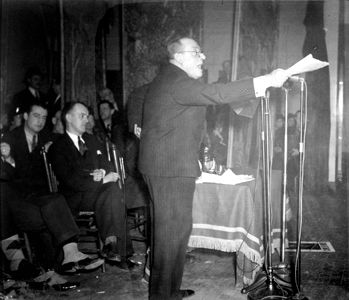
The Law
Houde Arrested for Sedition
Camillien Houde, the mayor of Montréal, was arrested by the RCMP for sedition in having advised Québec men not to take part in the compulsory National Registration.
-
April 29, 1941
The Law
Women Admitted to the Québec Bar
Québec law was changed to admit women to the Bar. They would have to wait until 1956 to become notaries.
-
January 01, 1944

Indigenous Peoples
Status Indian WWII Veterans Granted Right to Vote
Status Indian veterans who served in the Second World War and their spouses are permitted to vote in federal elections without losing status, with some conditions.
-
August 01, 1944
The Law
Family Allowance Act
The House of Commons approved the Family Allowance Act, providing monthly baby bonuses to parents of children under 18.
-
February 23, 1946
The Law
Yamashita Hanged
Japanese Lieutenant-General Tomoyuki Yamashita was hanged near Manilla, Phillipines, for war crimes.
-
May 14, 1946
Legislation
Canadian Citizenship Act Passed
The Canadian Citizenship Act was passed, to take effect 1 January 1947. The Act replaced British subject status with Canadian citizenship.
-
November 08, 1946
The Law
Desmond Faces Segregation
Businesswoman Viola Desmond entered a movie theatre in New Glasgow, NS but was asked to leave when staff informed her that tickets sold to African Canadians were for the balcony and the main floor was reserved solely for White patrons. She was forcibly dragged out by police when she refused to leave and was fined $20 and sentenced to 30 days in prison.
-
January 01, 1947
Legislation
Canadian Citizenship Act in Effect
The Canadian Citizenship Act, the first to define its people as Canadian rather than British subjects, came into effect.
-
January 01, 1947
Legislation
Canadian Citizenship Act and repeal of Chinese Immigration Act
Changes to federal legislation allow Chinese and South Asian Canadians to vote. However, it isn’t until 1951 that the final restrictions are lifted in provincial elections Canada-wide.
-
January 01, 1948
Indigenous Peoples Legislation
Amendments to Dominion Elections Act
Race is no longer grounds for exclusion from voting in federal elections. However, Status Indians still have to give up their Status in order to vote.
-
January 01, 1949
Indigenous Peoples Legislation
First Nations Win Right to Vote Provincially
Except in Nova Scotia and Newfoundland, Status Indians had been barred from voting provincially. Beginning with British Columbia in 1949 and ending with Quebec in 1969, First Nations peoples gradually win the right to vote in provincial elections without losing status or treaty rights.
-
January 01, 1949
.png)
Legislation
Japanese Canadians Win Right to Vote in BC
The last restriction on Japanese Canadians’ voting rights is lifted when British Columbia grants them the right to vote in provincial elections.
-
January 13, 1949
The Law
Supreme Court Made Final Court
The Supreme Court of Canada was made the final court of appeal in Canada, ending recourse to the British Privy Council.
-
January 01, 1950
Indigenous Peoples
Inuit Granted Right to Vote
Inuit are granted the right to vote in federal elections, but the isolation of several communities means many cannot access polling stations. Later reforms increase access to ballot boxes.
-
January 01, 1951
Indigenous Peoples
First Nations Women Granted Right to Vote in Band Council Elections
Changes to the Indian Act grant First Nations women the right to vote in band council elections.
-
September 16, 1952
The Law
Boyd Gang Captured
Police in Toronto recaptured the Boyd Gang. Jailed for armed robbery and murder, the four men had escaped Toronto's Don Jail for the second time eight days earlier.
-
January 09, 1953
The Law
Pitre Hanged
Marguerite Pitre, the last woman to be hanged in Canada, was executed at the Bordeaux jail. She was accused of participating in a plot to crash a Québec Airways DC-3 out of l'Ancienne-Lorette (Québec City), which killed 23 people. It was the first plane crash caused by a criminal act in North America.
-
March 06, 1957
The Law
Padlock Act Nullified
The Supreme Court of Canada nullified the Québec "Padlock Law" of 1937. The Act was a 1937 law in Québec that allowed police to close, or padlock, for one year any building where "communism or bolshevism" was being promoted.
-
June 11, 1962
The Law
Sons of Freedom Hearings Begin
Preliminary hearings in the conspiracy case against 72 Doukhobor protestors, known as the "Sons of Freedom," began at New Westminster, BC. The charges, for incidents that took place between 1958 and 1961, were dismissed a few months later.
-
December 11, 1962
The Law
Last Hangings in Canada
The last judicial hanging in Canada took place in Toronto's Don Jail, when Ronald Turpin and Arthur Lucas were executed for murder.
-
June 18, 1964
The Law
Married Women in Québec Gain Legal Capacity
Under Bill 16, Québec women were able to act independently of their husbands, i.e., make decisions without their husband’s approval. This ability to have legal capacity had a huge impact, particularly on contractual transactions. The bill was championed by Marie-Claire Kirkland-Casgrain, Québec’s first female member of the Legislative Assembly.
-
August 11, 1965
The Law
Klan Activity in Amherstburg
In 1965, racial tension ran high in Amherstburg, ON. A cross-burning set the tone; the Black Baptist Church was defaced and the town sign was spray-painted "Amherstburg Home of the KKK." Five days of racial incidents threatened to escalate but the situation was saved by an investigation by the Ontario Human Rights Commission. No arrests were made.
-
February 22, 1966
The Law
LaPointe Appointed Lieutenant-Governor
The Honourable Hugues LaPointe was appointed Québec''s 22nd lieutenant-governor, serving until 27 April 1978.
-
November 07, 1967
The Law
Mineral Rights Declared Federal
The Supreme Court ruled that offshore mineral rights on the West Coast belonged to the federal and not the BC government.
-
May 30, 1969
The Law
Milgaard Arrested
Sixteen-year-old David Milgaard was arrested in Prince George, BC, for the murder of Gail Miller in Saskatchewan. He would be cleared by DNA evidence almost 30 years later, in 1997.
-
July 09, 1969
Legislation
Official Languages Act (1969)
The Official Languages Act was given assent, to come into effect on September 7. It declared English and French the official languages of the federal administration. Federal government services — including all services related to federal elections — must now be available in both French and English. (See Official Languages Act, 1969.)
-
October 10, 1970
The Law
Pierre Laporte Kidnapped
Québec labour minister Pierre Laporte was kidnapped in the Montréal suburb of St Hubert by FLQ terrorists.
-
March 13, 1971
The Law
Rose Sentenced for Murder
Paul Rose was sentenced to life imprisonment for the murder of Pierre Laporte.
-
May 20, 1971
The Law
Simard Sentenced
FLQ member Francis Simard was sentenced to life in prison for his role in Pierre Laporte's murder during the October Crisis.
-
November 30, 1971
The Law
Rose Sentenced for Kidnapping
Paul Rose was sentenced to life in prison for the role he played in the kidnapping of Pierre Laporte during the October Crisis.
-
December 02, 1971
The Law
Gendron Report
The Gendron Report was published, recommending that Québec have French as its official provincial language while maintaining both English and French as its two national languages.
-
May 01, 1972
The Law
Compulsory Breath Tests
The Supreme Court ruled that compulsory breath tests administered by law enforcement officers constituted a "due process of the law" and therefore did not breach citizens' right to liberty and security of the person.
-
June 29, 1972
The Law
Supreme Ruling on Breathalyzer
The Supreme Court ruled that motorists could seek legal advice before submitting to a breathalyzer test.
-
September 04, 1972

The Law
Art Gallery Robbed
The Montreal Museum of Fine Arts was robbed of $2-million worth of paintings and other art objects, including a Rembrandt worth $1 million.
-
September 27, 1972
The Law
Sale of Firecrackers Banned
Ottawa banned the sale of firecrackers.
-
January 31, 1973
The Law
Aboriginal Title Recognized
The Supreme Court acknowledged the existence of Aboriginal title in law.
-
February 23, 1973
The Law
Rose Acquitted of Laporte Murder
Jacques Rose was acquitted of the murder of Pierre Laporte during the FLQ crisis. On 9 December 1972, he would also be acquitted of Laporte''s kidnapping but would be convicted of being an accessory after the fact on 17 July 1973.
-
July 18, 1973
The Law
Christine Demeter Murdered
Christine Demeter was murdered. Her husband, Peter Demeter, was sentenced to life imprisonment in December 1974 after Canada's longest and most bizarre murder trial.
-
September 07, 1973
The Law
NWT Court Allows Land Claim
The Northwest Territories Supreme Court allowed the Indian Brotherhood of the NWT to file a land claim for one-third of the NWT.
-
November 13, 1973
The Law
Jury Acquits Morgentaler
A jury acquitted Henry Morgentaler of violating the Criminal Code in performing abortions.
-
January 07, 1974
The Law
Bora Laskin Sworn In
Bora Laskin was sworn in as Chief Justice of the Supreme Court.
-
June 24, 1974
The Law
No Extradition for FLQ
Prime Minister Trudeau declared that Canada would not seek the extradition of the FLQ members who had fled to Cuba and then France.
-
August 01, 1974
Legislation
Election Expenses Act Passed
The Election Expenses Act came into force. The law provided for income-tax deductions, for disclosure of the source and amount of donations over $100, and limited the amount of money that could be spent in an election campaign.
-
November 29, 1974
The Law
Saskatchewan Hijacking
Naim Djemal hijacked an aircraft over Saskatchewan, assaulted a stewardess and ordered the pilot to fly to Cyprus. He was apprehended in Saskatoon.
-
July 15, 1975

The Law
Human Rights Commission Created
Legislation was introduced to create a Human Rights Commission.
-
July 23, 1975

The Law
Ottawa Bans Soviet Fleet
Ottawa banned the Soviet Atlantic fishing fleet from Canadian ports for overfishing.
-
August 01, 1975
The Law
Helsinki Accords
The Helsinki accords were signed. Canada was one of the signatories, agreeing to respect the human rights and freedoms of its subjects.
-
November 18, 1975
The Law
Mandatory Seat Belts
Ontario introduced legislation to make the wearing of seat belts mandatory.
-
February 04, 1976
The Law
Ruling on Censorship in NS
The Supreme Court of Nova Scotia ruled that the province did not have the right to censor motion pictures.
-
June 30, 1976
The Law
Members Vote vs Death Penalty
MPs voted 148-127 not to reinstate the death penalty.
-
February 16, 1977
The Law
White Appointed
Marjorie (Cantryn) White became the first Indigenous woman in BC to be appointed a citizenship judge.
-
August 26, 1977
The Law
Bill 101 Passed
Bill 101, Québec's French-language charter, was passed by the National Assembly.
-
January 21, 1980
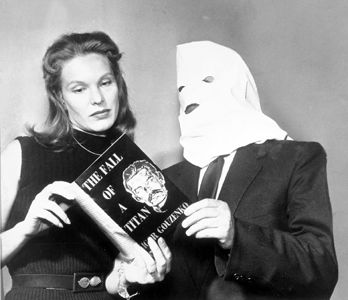
The Law
Canada Expels Spies
Canada expelled 3 Soviet Embassy employees for spying. They had been involved in buying classified information from a US citizen in Ottawa.
-
February 05, 1981

High-Profile Cases
Toronto Bathhouse Raids Constitute Largest Mass Arrest in Canada Since the October Crisis
Police bathhouse raids, a common occurrence in the late 1970s, reached a climax with “Operation Soap.” (See 1981 Toronto Bathhouse Raids.) Almost 200 police officers carried out a massive raid on four major Toronto bathhouses: The Barracks, Club Baths Toronto, Richmond Street Health Emporium, and Romans II. The police charged 286 men either as found-ins or as keepers of a common bawdy house. It was the largest mass arrest in Canada since the October Crisis of 1970. The men were humiliated and insulted by the police. The city’s health department required the men to undergo compulsory STI checks. The following night, more than 3,000 people marched in protest of the raids. The demonstrators damaged police cars blockading the march, which ended at the Legislative Assembly of Ontario at Queen’s Park, where demonstrators tried breaking down the front doors.
-
June 12, 1981
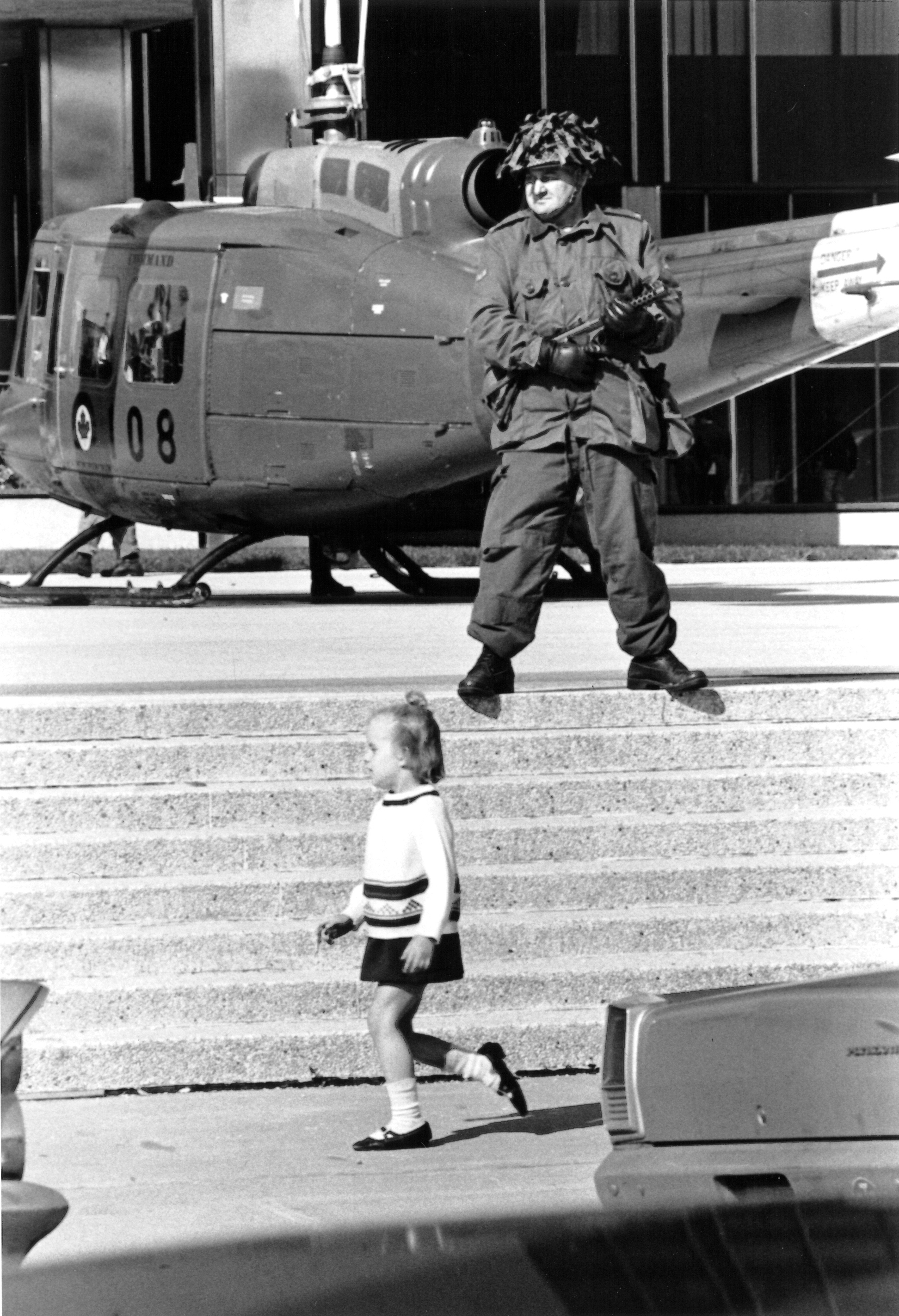
The Law
RCMP Charged in October Crisis
Seventeen present or past members of the RCMP were charged with a total of 44 offences following the Keable Report. The offences were connected to illegal operations conducted after the October Crisis.
-
September 28, 1981
The Law
Court Rules on Patriation
The Supreme Court of Canada ruled that the federal proposal to patriate the Constitution unilaterally was strictly legal, but offended the constitutional convention requiring provincial consent.
-
March 08, 1982
Legislation
Canada Act Passed
The British House of Commons passed the Canada Act of 1982. It was adopted by the House of Lords on March 25. The Act ended British legislative jurisdiction over Canada. Queen Elizabeth II signed the proclamation in Ottawa on April 17.
-
April 17, 1982

Legislation The Law
Canadian Charter of Rights and Freedoms
The Canadian Charter of Rights and Freedoms affirms the right of every Canadian citizen 18 and older to vote and to stand as a candidate.
-
June 28, 1982
The Law
Access to Information Act
The Access to Information Act was passed by the House of Commons. It came into effect in July 1983.
-
December 10, 1982
The Law
200-Mile Limit Set
An international Law of the Sea agreement was signed, entrenching a 200-mile international limit.
-
March 30, 1983

The Law
Bertha Wilson Sworn In
Bertha Wilson was sworn in as Canada's first female Supreme Court Justice. She was appointed on March 4.
-
June 09, 1983

The Law
Bill 101 Violates Charter
The Québec Court of Appeal ruled that Bill 101, Québec's language law, violated the Charter of Rights and Freedoms.
-
September 18, 1984
The Law
Hunter v Southam Case
In Hunter v Southam the Supreme Court of Canada declared that some sections of the Combines Investigation Act violated a portion of the Canadian Charter of Rights and Freedoms, following a claim by Southam Inc that their newspaper offices were improperly searched.
-
December 15, 1984
The Law
Bill 101 Challenged
The Supreme Court of Canada ruled that the compulsory exclusive use of French on public commercial signs, as per Bill 101, was contrary to the right of freedom of speech. The Bourassa government reacted by introducing Bill 178, reinstating the use of French-only signs.
-
January 03, 1985
The Law
Grange Commission Report on Infant Deaths
Ontario Supreme Court Justice Samuel Grange delivered his report into infant deaths at Toronto’s Hospital for Sick Children. The inquiry had been called to look into the deaths of some 36 babies, many of them suspicious. Grange determined that nurse Susan Nelles, charged with murdering several babies, had been wrongly accused, but no one else was held criminally responsible. As of 2015, there were still no answers.
-
February 13, 1985
The Law
Lortie Found Guilty
Denis Lortie was found guilty of the first degree murder of 3 government employees in a submachine-gun attack on Québec's National Assembly in May 1984.
-
February 28, 1985
The Law
Zündel Convicted of Intolerance
Ernst Zündel was convicted of publishing false news causing harm to racial tolerance by publishing his claims that the mass extermination of Jews in Nazi Germany never occurred. The conviction was later overturned on constitutional grounds.
-
April 04, 1985
The Law
Singh Case
In the Singh Case, the Supreme Court of Canada concluded that a refugee has the right not to "be removed from Canada to a country where his life or his freedom would be threatened."
-
April 24, 1985
Legislation The Law
Lord's Day Act Ruled Contrary
The Supreme Court of Canada found that the Lord's Day Act was contrary to the freedom of religion guaranteed in the Charter of Rights.
-
May 09, 1985
The Law
Cabinet Ruling by Supreme Court
The Supreme Court declared that federal Cabinet decisions are subject to judicial control under the Charter of Rights and Freedoms.
-
September 29, 1985
The Law
Bank Inquiry Announced
The federal government announced an inquiry, headed by Supreme Court Justice Willard Estey, to investigate the failures of the Calgary-based Northland Bank and Edmonton's Canadian Commercial Bank.
-
June 19, 1986
The Law
New Competition Act
The new Competition Act and Competition Tribunal Act came into force.
-
December 30, 1986
The Law
War Crimes Commission Reports
The Commission of Inquiry into War Criminals reported after examining 3 lists of suspects. In most cases the commission found that the accused was either not in Canada or that there was no evidence that the individual had participated in war crimes.
-
January 01, 1988
Supreme Court of Canada
People with Intellectual Disabilities Granted Right to Vote
People with intellectual disabilities are granted the right to vote after a successful Charter challenge.
-
December 06, 1989

The Law
École Polytechnique Massacre
Marc Lépine, a 25-year-old with a hatred of women, went on a shooting rampage at École Polytechnique, the Université de Montréal's engineering faculty, killing 14 women and wounding 14 more people before committing suicide. In the wake of the tragedy, issues such as gun control, misogyny and gender-based violence came to the fore of public debate in Canada. Tighter firearms laws were instituted in the years that followed, and the events of 6 December have had a lasting influence on efforts to end gender-based violence.
-
January 26, 1990
The Law
Donald Marshall Exonerated
The royal commission investigating the wrongful murder conviction of Donald Marshall Jr reported that the justice system had failed him. He had been imprisoned for 11 years for a murder he did not commit.
-
March 15, 1990
The Law
Sikh Mounties Permitted to Wear Turbans
The Solicitor General of Canada, Pierre Cadieux, announced the decision in the Baltej Singh Dhillon case, allowing Sikh RCMP officers to wear a turban while in uniform.
-
March 08, 1991
The Law
Gitksan Court Case
In Delgamuukw et al v The Queen, the BC Supreme Court ruled that, according to treaties, the Gitksan do not have Aboriginal title to the land, but they do have the right to use it for subsistence.
-
January 01, 1992
Legislation
Bill C-78
Bill C-78 passes, changing the voting and electoral processes to make them more accessible to people with disabilities.
-
January 06, 1992
The Law
Nancy B.
The Québec Superior Court gave paralysed patient Nancy B. the right to be disconnected from a respirator, which would result in her death.
-
May 15, 1992

The Law
Westray Inquiry Set
Mr Justice Peter Richard was named to head an inquiry into the Westray mine disaster.
-
August 27, 1992
The Law
Zündel Acquitted
Holocaust denier Ernst Zündel was acquitted of charges for violating section 181 the Canadian Criminal Code pertaining to freedom of speech for publishing his treatise "Did Six Million Really Die?" Zündel was eventually deported back to Germany where he subsequently stood trial for and was convicted of holocaust denial in 2007. He was released on 1 Mar 2010.
-
January 01, 1994
The Law
Québec Civil Code
The Civil Code of Québec, the legal text defining civil laws in the province, came into effect.
-
January 23, 1995
The Law
Morin Conviction Overturned
The Ontario Court of Appeal overturned a conviction of Guy Paul Morin for the 1984 murder of a neighbourhood girl. DNA evidence showed that he could not have been the killer.
-
February 21, 1995
The Law
Kingston Women's Prison Report
A federal ombudsman released a report accusing officials of the Prison for Women in Kingston, Ont, of using excessive force in quelling a disturbance in April 1994.
-
March 20, 1995
The Law
Tobias Accused of War Crimes
The federal Immigration Department began legal proceedings against Erichs Tobias, a former Latvian accused of war crimes.
-
May 18, 1995
The Law
Bernardo Trial Begins
The trial of Paul Bernardo, accused of the murder and torture of 2 girls, began.
-
May 23, 1995
The Law
Tan Acquitted
An Edmonton judge acquitted Marilyn Tan of charges that she had injected her former lover Conrad Boland with HIV-infected blood.
-
May 25, 1995
The Law
Court Rules Against Discrimination
The Supreme Court of Canada ruled that the Charter protects the rights of homosexuals against discrimination, though sexual orientation is not specifically mentioned in the Charter.
-
June 13, 1995
The Law
New Gun Bill Passed
The House of Commons passed its Gun Bill, with a vote of 192-63, barring handguns and requiring all firearms to be registered.
-
June 20, 1995
The Law
Drunkenness Defence Bill
The House of Commons approved a bill to prevent suspects accused of assault from using drunkenness as a defence.
-
July 20, 1995
The Law
Largest Libel Award
The Supreme Court of Canada upheld a $1.6 million libel award to Casey Hill, the largest in Canadian history, in his dispute with the Church of Scientology.
-
August 02, 1995
The Law
Sportscaster Shot
Sportscaster Brian Smith was shot and killed in Ottawa by Jeffrey Arenburgh, who cited anger against the media as his motive.
-
September 01, 1995
The Law
Bernardo Found Guilty
A jury found Paul Bernardo guilty of the kidnapping, rape and murder of 2 girls in 1991 and 1992.
-
September 23, 1995

The Law
Dionne Quints Claim Abuse
Three of the famous Dionne quintuplets, Annette, Cécile and Yvonne claimed in a television interview that they had been sexually abused by their father. The claim was repeated in their book, The Dionne Quintuplets: Family Secrets.
-
April 05, 1996
The Law
Mass Murder in Vernon, BC
Rajwar Gakhal, along with her father, mother, four sisters, brother, and the husband of one of the sisters, were shot to death by Gakhal's 30-year-old ex-husband, who later shot and killed himself. Gakhal's family was gathered for the wedding of Balwinder Kaur Gakhal, one of the four sisters. At the time, the nine victims represented the second-largest mass murder in Canadian history, behind the École Polytechnique Tragedy (Montreal Massacre).
-
May 09, 1996
The Law
Joudrie Acquitted
Dorothy Joudrie was acquitted of charges of the attempted murder of her estranged husband, Calgary businessman Earl Joudrie. The jury found that she was suffering from a mental disorder.
-
May 29, 1996
The Law
RCMP Board Taiwanese Ship
RCMP officers boarded the Taiwan-registered ship Maersk Dubai and arrested the captain on charges of murdering 2 Romanian stowaways.
-
July 30, 1996
The Law
Violent Crime Rate Down
StatsCan reported that the violent crime rate in Canada had dropped to 995 incidents per 100 000 population, the third consecutive year the rate had fallen.
-
December 03, 1996
The Law
Eagleson Charged
The RCMP finally charged Alan Eagleson, former executive director of the NHL Players Association, with fraud and theft. He had been indicted in 1994 for racketeering and fraud.
-
January 01, 1997

Legislation
BNA Amendment Allows Neutral Linguistic School Boards
The Jewish School Question was finally resolved in 1997 when section 93 of the BNA Act was amended. This enabled the creation of religiously neutral linguistic school boards to replace confessional schools in Quebec. The transition to a secular public school system granted legal education rights to the Jewish community in Quebec after more than 100 years of inequality.
-
February 06, 1997

The Law
Latimer to be Retried
A federal court ruled that Robert Latimer be retried for murder charges in the mercy killing of his daughter, citing flagrant abuse of process by the prosecution.
-
July 09, 1997
The Law
Miss Canada Gives Up Title
Danielle House gave up her Miss Canada International title after pleading guilty of assault against her boyfriend's ex-girlfriend.
-
July 30, 1997
The Law
Violent Crime Down
Statistics Canada reported that violent crime in Canada had dropped for the fourth straight year to 973 incidents per 100 000 population, including 633 murders.
-
October 01, 1997
The Law
Bastarache Named New Supreme Court Justice
PM Jean Chrétien named Justice Michel Bastarache to fill the vacancy left on the Supreme Court by Gerard LaForest. He became the first Acadian appointed to the Supreme Court of Canada.
-
October 01, 1997
The Law
Referendum Law Struck Down
The Supreme Court of Canada struck down Québec's controversial law limiting spending on referenda.
-
November 18, 1997
The Law
Constitution Act Amended
Parliament voted to amend the 1982 Constitution Act in order to allow Québec to replace its religion-based school system with one drawn along linguistic lines.
-
November 24, 1997
The Law
Death of Judge Sopinka
John Sopinka, former Supreme Court of Canada judge, died at the age of 64 in Ottawa. he was a vigorous champion of the rights of the accused.
-
December 01, 1997

The Law
Westray Report Issued
Justice Peter Richard of NS issued a report on the Westray mine disaster that cited slipshod government inspection and the mine management's disregard for safety as being responsible for the explosion.
-
January 06, 1998
The Law
Eagleson Pleads Guilty
Alan Eagleson pled guilty to fraud in Boston, Mass, and fined $1 million.
-
January 07, 1998
The Law
Eagleson Pleads Guilty Again
Alan Eagleson pleaded guilty to fraud in a Toronto court and was sentenced to 18 months in prison.
-
February 13, 1998
The Law
Girls Found Guilty in Slaying
Three girls of ages 14, 15, and 16 were found guilty in Victoria, BC, of killing 14-year-old Reena Virk. Three others pled guilty of assault.
-
February 16, 1998
The Law
Unilateral Secession Dispute
The Supreme Court of Canada began to hear arguments on whether unilateral secession by Québec would be legal.
-
February 27, 1998
The Law
Eagleson Stripped of Order
Governor General Romeo LeBlanc announced that Alan Eagleson had been expelled from the Order of Canada after his conviction for fraud.
-
August 20, 1998
The Law
Supreme Court Rules on Separation
The Supreme Court of Canada ruled that Québec could not secede from Canada without first negotiating the terms of secession with the federal government and the other provinces.
-
April 06, 1999
The Law
Gun Rampage in Ottawa
Pierre Lebrun, a former employee of OC Transpo, an Ottawa bus company, shot and killed 4 workers and wounded another before killing himself.
-
April 12, 1999
The Law
First Black Judge in Québec
The government of Québec appointed Juanita Westmorland-Traore as the first black judge of the Québec court.
-
April 23, 1999
The Law
Court Rules on Sentencing of Indigenous People
The Supreme Court of Canada ruled that the lower courts should apply traditional disciplinary practices when sentencing Indigenous persons found guilty of criminal offences.
-
April 28, 1999
The Law
Taber Killings
A 14-year-old boy armed with a .22 calibre rifle shot two students at W.R. Myers High School in Taber, Alberta. One died and the other was critically injured. The shooting occurred just eight days after the Colorado massacre.
-
May 17, 1999
The Law
Milgaard Award
The Saskatchewan government awarded David Milgaard $10 million in compensation for his wrongful conviction for murder and 23 years of imprisonment. Milgaard was cleared by DNA evidence in 1997.
-
May 20, 1999
The Law
Gay Spousal Rights
The Supreme Court of Canada struck down the definition of the term "spouse" in Ontario law under which homosexuals were denied the right to sue for spousal support.
-
May 20, 1999
The Law
Off-Reserve Voting Rights
The Supreme Court of Canada ruled unanimously to open Indigenous band elections to off-reserve band members, stating that excluding them violated the Canadian Charter of Rights and Freedoms.
-
June 17, 1999
The Law
Faulder Executed
Canadian citizen Joseph Stanley Faulder was executed in Huntsville, Texas, the first Canadian executed in the US since 1952.
-
June 30, 1999
The Law
Controversial Ruling on Child Pornography
The BC Court of Appeal upheld a lower court ruling that struck down a law prohibiting the possession of child pornography, stating that the law violated privacy and freedom of expression. The next year, however, in R v. Sharpe, the Supreme Court of Canada ruled in favour of the law against child pornography, finding that it balances freedom of expression with the protection of children. The case was finally sent back to the British Columbia Supreme Court, where John Robin Sharpe was convicted of possessing child pornography.
-
July 09, 1999
The Law
Unborns Cannot Sue Parents
The Supreme Court of Canada ruled that children could not sue their mothers for injuries suffered while they were in the womb. The case was brought in 1993 by Gerald Price on behalf of his grandson, who was injured in a car crash.
-
July 09, 1999
The Law
Child Refugee Rights
The Supreme Court of Canada ruled unanimously that immigration officers must consider children's best interests before deporting their illegal immigrant parents.
-
August 21, 1999
The Law
Justice Lamer Retires
Chief Justice Antonio Lamer announced his retirement from the Supreme Court of Canada, effective January 7, 2000.
-
September 15, 1999

The Law
Arbour Joins Supreme Court
Louise Arbour was sworn in as Supreme Court justice one day after stepping down as chief prosecutor of the International Criminal Tribunal investigating crimes in the former Yugoslavia.
-
September 17, 1999
The Law
Mi'kmaq Fishing Rights Upheld
The Supreme Court of Canada ruled that treaties from the 1760s guaranteed Mi'kmaq rights to fish, hunt and log year round. The ruling sparked controversy, as the Mi'kmaq began to fish lobster out of season. Angry non-Indigenous fishermen destroyed lobster traps and other equipment, sunk a boat and carried out an armed blockade of Yarmouth Harbour, NS. The conflict ended when an agreement was reached that allowed the Mi’kmaq to fish for subsistence only.
-
November 16, 1999
The Law
Skinheads Sentenced
A BC judge sentenced 5 skinheads to prison for the 1998 beating death of Nirmal Singh Gill. The judge ruled that the attack was racially motivated.
-
November 17, 1999
The Law
Mi'kmaq Rights Clarified
The Supreme Court of Canada clarified its earlier ruling (September 17) regarding Mi'kmaq (Micmac) fishing rights, stating that the ruling had been misinterpreted. It stated that the ruling applied did not guarantee open season on fishing.
-
November 22, 1999
The Law
Fisher Found Guilty
Convicted serial rapist Larry Fisher was found guilty of the murder in 1969 of Gail Miller. The verdict ended the 30-year saga of David Milgaard, wrongly convicted of the murder.
-
November 25, 1999
The Law
Court Upholds Assault Law
The Supreme Court upheld a controversial law protecting the confidentiality of a sexual-assault complainant's counselling documents.
-
December 14, 1999
The Law
Algerian Terrorist Stopped at US Border
US customs officials arrested an Algerian-born man, named Ahmed Ressam, entering the US from Canada at Port Angeles, Washington. He was headed for Los Angeles International Airport, where he planned to blow up a terminal on New Year's Eve.
-
January 07, 2000

The Law
Chief Justice Beverley McLachlin Sworn In
The first female Chief Justice of Canada, the Right Honourable Beverley McLachlin, was appointed by Prime Minister Jean Chrétien. McLachlin is the longest serving chief justice in Canadian history and has been on the top court’s bench for 25 years. Her aim has been to make the court more transparent, with faster turnaround and consensus-oriented decisions.
-
April 19, 2000

The Law
Ludwig Found Guilty
An Alberta judge found activist Wiebo Ludwig guilty of a 1998 gas-well bombing. Ludwig claimed that the wells were responsible for deadly pollution in the area.
-
June 09, 2000
The Law
Border Security Agreement
Canada and the United States signed a border security agreement under which the two countries would bolster security along the eastern border directed by a joint enforcement team.
-
August 03, 2000
The Law
Mafia Boy Arrested
The RCMP filed charges against a 16-year-old Montreal boy whom it had arrested in April in connection with computer attacks that paralysed several Internet sites, including CNN.
-
January 01, 2001
The Law
Religious Tolerance and the Kirpan
In 2001, the Supreme Court of Canada ruled that a Québec student had the right to wear a kirpan while in school. The Québec Court of Appeal struck down the decision in 2004, ruling that community safety was more important than wearing the ceremonial dagger, but in 2006 the Supreme Court again decided that religious tolerance was to be encouraged in Canadian society and that a total ban infringed on the guarantee of religious freedom under the Charter of Rights.
-
January 18, 2001

The Law
Court Upholds Latimer Sentence
The Supreme Court of Canada upheld the 10-year sentence imposed by Saskatchewan Court of Appeal on Robert Latimer for the mercy killing of his disabled daughter. A jury had handed down a lighter sentence.
-
January 26, 2001
The Law
Court Upholds Law Against Child Porn
The Supreme Court of Canada upheld a federal law prohibiting the possession of child pornography, overruling a lower court decision that struck down the law on the basis of freedom of speech.
-
June 30, 2001
The Law
Duplessis Orphans
Some 1500 Duplessis Orphans received an apology and a fault-free offer of compensation. Each received a lump sum payment of $10 000 and an additional $1000 for each year spent in an asylum, roughly $25 000 per person.
-
October 31, 2002
Supreme Court of Canada
All Prisoners Granted Right to Vote
In Sauvé v Canada, the Supreme Court of Canada holds that, under the Charter of Rights and Freedoms, all prisoners have the right to vote.
-
November 06, 2003
The Law
Canada Ratifies Law of the Sea
Canada ratified the United Nations Convention of the Law of the Sea, which entered into force in 1994.
-
March 19, 2004

The Law
Same-Sex Marriage Legalized
A Court of Appeal ruling legalized same-sex marriage in Québec.
-
January 08, 2007
The Law
James Pardoned
Convicted sex offender Graham James was granted a pardon by the National Parole Board. Found guilty of 2 counts of abuse involving hockey players he coached, he was sentenced in 1997 to 3 and a half years in prison. The pardon was not made public until 4 Apr 2010 when another victim came forward to report alleged abuse.
-
December 10, 2007
The Law
Pickton Convicted
Accused serial killer Robert Pickton was found guilty of the second-degree murders of Sereena Abotsway, Andrea Joesbury, Mona Wilson, Georgina Papin, Brenda Wolfe and Marnie Frey, sex trade workers who disappeared from Vancouver's Downtown Eastside between 1997 and 2001.
-
April 01, 2010

The Law
Juana Tejada Law Amends the Immigration and Refugee Protection Act
An amendment to the Immigration and Refugee Protection Act known as the “Juana Tejada Law” was passed. It was named for Juana Tejada, a caregiver and activist who helped push for reforms to the federal Live-in Caregiver Program (LCP). After working in Canada for two years, Tejada was denied permanent residency as she had a severe form of cancer. Under the Juana Tejada Law, foreign caregivers would no longer need a second medical exam when applying for permanent residency, so long as they had worked long enough in Canada.
-
September 30, 2011
The Law
Top Court Defends Safe Injection Sites
In a landmark decision, the Supreme Court of Canada barred the federal government from closing Insite, a safe injection facility in Vancouver. Maintaining that such services play a crucial role in treating drug addiction and saving lives, the court decided that the benefit to public health outweighed the government's concerns surrounding the sanctioned use of illegal substances.
-
January 25, 2013
The Law
Supreme Court of Canada releases judgement on common-law rights in Québec
In the now famous Lola v. Eric case, the Supreme Court of Canada rules clause 585 of the Civil Code of Québec "discriminatory but acceptable". This clause does not recognize the same rights for common-law spouses and married couples upon the dissolution of the relationship.
-
December 20, 2013
The Law
Prostitution Laws Struck Down
The Supreme Court of Canada ruled that the nation's prostitution laws violated sex workers' constitutional rights — namely, the right to practice their trade safely and to exercise freedom of expression. "It is not a crime in Canada to sell sex for money," noted Chief Justice Beverley McLachlin in the decision, which gave Parliament one year to rewrite the law.
-
January 10, 2014
Indigenous Peoples
First Indigenous Constitution in Ontario
Members of the Nipissing First Nation voted in favour of adopting their own constitution, or Gichi-Naaknigewin, believed to be the first such document among First Nations communities in Ontario. Its purpose is to allow the nation to define its membership and create laws. Legal experts say it is unclear, however, whether this constitution will run up against Canadian laws such as the Indian Act, which it is designed to replace.
-
March 20, 2014
The Law
Retroactive Changes to Parole Eligibility Struck Down
The Supreme Court of Canada ruled that the application of the Abolition of Early Parole Act to offenders who had already been sentenced was unconstitutional. The court maintained that these offenders would have been "thwarted" in their expectation of liberty and effectively punished again for the same crime.
-
March 21, 2014
The Law
Justice Nadon Denied Seat on Top Court
The unprecedented legal drama surrounding Prime Minister Stephen Harper's 2013 appointment of Québec judge Marc Nadon to the Supreme Court of Canada reached its decisive moment when the same court ruled, in a 6–1 decision, that Nadon did not meet the criteria for judges representing Québec on the court. Many commentators had been surprised by the appointment, viewing Nadon as an unlikely candidate for the seat, but it wasn't until Toronto lawyer Rocco Galati legally challenged the appointment that Nadon's position was jeopardized.
-
April 25, 2014
The Law
Supreme Court Rules on Senate Reform
In response to changes proposed by the Harper government, Canada's top court decided that Parliament cannot unilaterally make fundamental changes to the Senate. It ruled that abolishing this long-standing political institution would require consent from all the provinces, while introducing new term limits or elections for Senators would require consent from seven provinces representing half the population.
-
January 30, 2015
The Law
Right to Strike Upheld by Supreme Court
The Supreme Court of Canada decided that the right to strike was constitutionally protected under the freedom of association clause of the Charter of Rights and Freedoms. The ruling struck down a Saskatchewan law that allowed government to prevent workers in essential services from striking.
-
February 06, 2015

The Law
Supreme Court Rules Against Ban on Assisted Suicide
In a historic decision on an emotionally charged issue, the Supreme Court of Canada ruled that competent adults suffering from enduring and "irremediable" medical conditions should have the right to doctor-assisted suicide. The unanimous ruling gave Parliament one year to change the existing laws.
-
March 19, 2015
The Law
Supreme Court Rules on Faith-Based Education
The top court decided that the Québec government infringed on religious freedom by requiring that a Jesuit high school in Montréal teach a course on ethics and religious culture from a secular, neutral perspective. The decision affirmed Loyola High School's right to include its own perspective in the course, which is designed to promote understanding of diverse cultures and religious traditions.
-
May 07, 2015
The Law
Omar Khadr Freed on Bail
Toronto-born Omar Khadr, whom the United States captured in a firefight during the war in Afghanistan in 2002, was granted bail by an Alberta judge. At 15 years old, Khadr was accused of throwing a grenade that killed an American soldier, detained at Guantanamo Bay and later charged for his role in the firefight by the US military. In 2010, he pleaded guilty to five war crimes charges. In 2012, he was granted a transfer to the Canadian prison system to serve out the rest of his eight-year sentence. Khadr's polarizing and controversial legal saga ranks among the highest-profile cases in 21st-century Canada.
-
May 11, 2015

People
Death of Alan Borovoy
Civil rights activist and lawyer Alan Borovoy died at the age of 83. Often cited for his ardent defence of free speech, Borovoy served as general counsel for the Canadian Civil Liberties Association from 1968 to 2009. He also authored several books and a column that ran in the Toronto Star from 1992 to 1996. Borovoy was named an Officer of the Order of Canada in 1982.
-
March 24, 2016
High-Profile Cases
Ghomeshi Acquitted in First Sexual Assault Trial
A verdict of not guilty on all charges was delivered at the end of former CBC host Jian Ghomeshi’s first trial on charges of sexual assault. In his decision, Justice William Horkins questioned the credibility of the three complainants. The high-profile proceedings raised questions about why victims of sexual assault might stay silent for years before making complaints to the police. In addition, the gruelling cross-examinations each woman went through during the trial threw a national spotlight on how complainants may be treated inside a courtroom.
-
April 14, 2016

Supreme Court of Canada
Supreme Court Ruling Changes Legal Definition of “Indian”
The Supreme Court of Canada rules unanimously that the legal definition of “Indian” — as laid out in the Constitution — includes Métis and non-status Indians. While this ruling did not grant status to Métis and non-status Indians, it helped facilitate possible negotiations over traditional land rights, access to education and health programs, and other government services.
-
May 11, 2016
High-Profile Cases
Ghomeshi Signs Peace Bond, Avoids Second Trial
Weeks after the end of his first sexual-assault trial, former CBC host Jian Ghomeshi avoided a second trial by signing a peace bond in which he committed to be of good behaviour and avoid contact with former CBC co-worker Kathryn Borel. Ghomeshi also apologized to Borel in court for "sexually inappropriate" behaviour toward her when they worked together. In her statement to the public, Borel said that while the ordeal “won’t be over until he admits to everything that he’s done,” the apology was “the clearest path to the truth.”
-
May 17, 2016

Legislation
Liberals Table Transgender Rights Bill
On the International Day Against Homophobia, Transphobia and Biphobia, Liberal justice minister Jody Wilson-Raybould introduced legislation to protect the rights of transgender Canadians. If passed, the bill would make it illegal to deny someone a job or discriminate against them in the workplace based on their gender identity or expression. The Criminal Code would also be updated to protect transgender individuals from being targeted by hate propaganda and hate crimes.
-
June 02, 2016

High-Profile Cases
Longest Jury Trial in Canadian History
Ronald Weinberg, the founder of Cinar, a once-successful children’s television production company based in Montréal, was found guilty of defrauding the company of $120 million along with associates Lino Matteo and John Xanthoudakis. The trial ran for over two years and was reported to be the longest jury trial in Canadian history. Eleven of the original panel of 14 jurors served for the entire duration of the proceedings.
-
June 17, 2016
Legislation
Assisted Dying Bill Passed
The Senate passed a new law allowing physician-assisted dying for terminally ill patients who are suffering and whose death is “reasonably foreseeable.” The creation of the law, which spurred intense debate among Canada’s parliamentarians and senators, was prompted by a 2015 Supreme Court of Canada decision that ended the ban on assisted suicide.
-
February 14, 2017
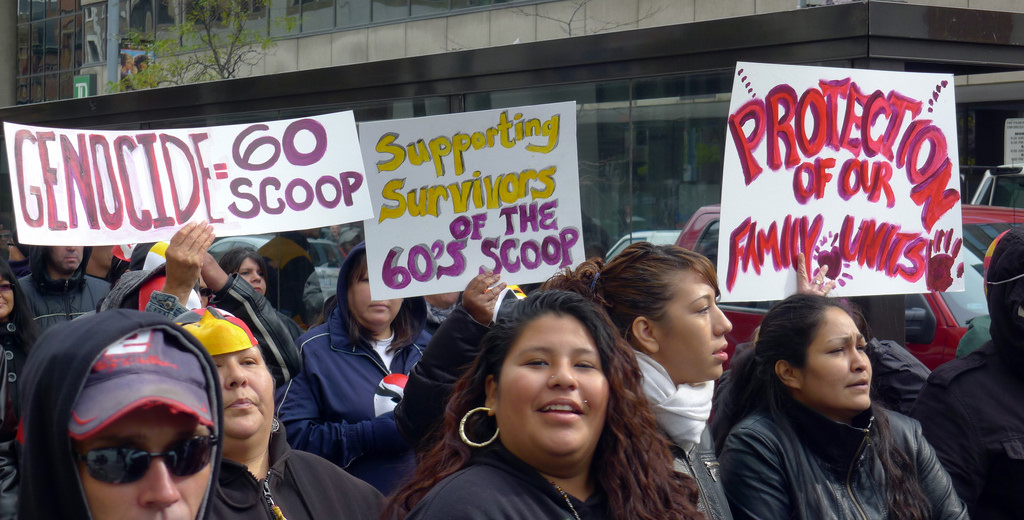
Indigenous Peoples
First Victory of a Sixties Scoop Lawsuit
Ontario Superior Court judge Edward Belobaba ruled in favour of Sixties Scoop victims, finding that the federal government did not take adequate steps to protect the cultural identity of on-reserve children taken away from their homes. This was the first victory of a Sixties Scoop lawsuit in Canada.
-
May 18, 2017

Legislation
Law Changes to Address Opioid Crisis
Bill C-37, An Act to amend the Controlled Drugs and Substances Act and to make related amendments to other Acts, received Royal Assent and became federal law. Presented by health minister Jane Philpott, the bill aimed to combat Canada’s opioid crisis, an epidemic of addiction to painkiller drugs such as fentanyl and oxycodone. Among other changes, it simplified the process for opening supervised consumption sites, made it harder to import drug-making equipment such as pill presses and allowed border officers to open mail weighing 30 grams or less.
-
July 05, 2017

High-Profile Cases
Omar Khadr Receives Settlement and Apology from Ottawa
The Liberal government of Prime Minister Justin Trudeau awarded Omar Khadr $10.5 million in compensation for the violation of his constitutional rights while he was a prisoner at the US naval base at Guantanamo Bay, Cuba, as a teenager. Canadian officials had participated in his interrogation on the condition that they share the information with the Americans. The controversial compensation package, along with a formal apology issued two days later, settled the lawsuit Khadr had launched against the government years earlier.
-
November 29, 2017
Supreme Court of Canada
Sheilah Martin appointed new justice to the Supreme Court of Canada
Sheilah Martin was appointed new justice to the Supreme Court of Canada. The Montreal-born and Alberta-based judge takes over the seat left by the retirement of Chief Justice Beverley McLachlin (Richard Wagner took over the position of Chief Justice on 18 December 2017). With a wide legal and judicial expertise and bilingual in both French and English, she brings 30 years of experience to the Supreme Court. Among her famous cases, she crafted the Residential Schools settlement and rendered an important judgment regarding compensation for wrongful conviction.
-
December 15, 2017
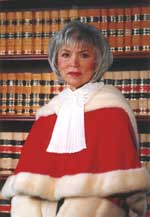
People Supreme Court of Canada
Chief Justice Beverley McLachlin retires
The Right Honorable Beverley McLachlin retires from her position as Chief Justice of the Supreme Court of Canada after 28 years on the bench, 17 of which were spent as Chief Justice. Born into a rural Alberta farming family of modest means, McLachlin rose to become the first female chief justice of a Commonwealth high court and the longest serving chief justice of the Supreme Court of Canada.
-
December 18, 2017
Supreme Court of Canada
Richard Wagner sworn in as new Chief Justice of the Supreme Court
Richard Wagner was sworn in as the new Chief Justice of the Supreme Court of Canada. He was called to the Québec Bar in 1980 and worked at the law firm Lavery, de Billy in Montréal until his appointment to the Superior Court in 2004. While at this court, he sat in the Civil, Commercial and Criminal Divisions. In 2011, Richard Wagner was appointed to the Québec Court of Appeal. Less than two years later, in 2012, he was appointed to the Supreme Court of Canada and then, on 18 December 2017, he was sworn in as Chief Justice, the highest judicial position in the country. His appointment follows a long tradition of having alternatively a Chief Justice from a Common Law background and then one with a Civil Law background. He replaced Beverley McLachlin as Chief Justice.
-
January 18, 2018
High-Profile Cases
Bruce McArthur charged with multiple murders
Bruce McArthur, suspected of murdering two men, was arrested at his Toronto home. The 66-year-old was later charged with multiple additional murders after bodies were discovered in private gardens McArthur had worked on as a landscaper. His alleged victims were gay men.
-
January 26, 2018
High-Profile Cases
Death of Barry and Honey Sherman ruled a homicide
Toronto police announced that Barry and Honey Sherman, found dead in their
Toronto mansion on 15 December 2017, were the targeted victims of a double homicide. Private investigators hired by the Sherman family concluded that the murders appeared to be contract killings. Barry Sherman, founder of the drug company Apotex, was the 15th richest person in Canada with a net worth of almost $5 billion. -
January 11, 2019

High-Profile Cases Supreme Court of Canada
Supreme Court Guarantees Expat Voting Rights
In a 5–2 decision, the Supreme Court ruled that expat Canadians can vote in federal elections regardless of how long they’ve lived outside the country. The ruling, which came a month after the Liberal government passed similar legislation, reversed a 1993 law and will likely prevent any future legislation from infringing on expat voting rights.
-
February 08, 2019
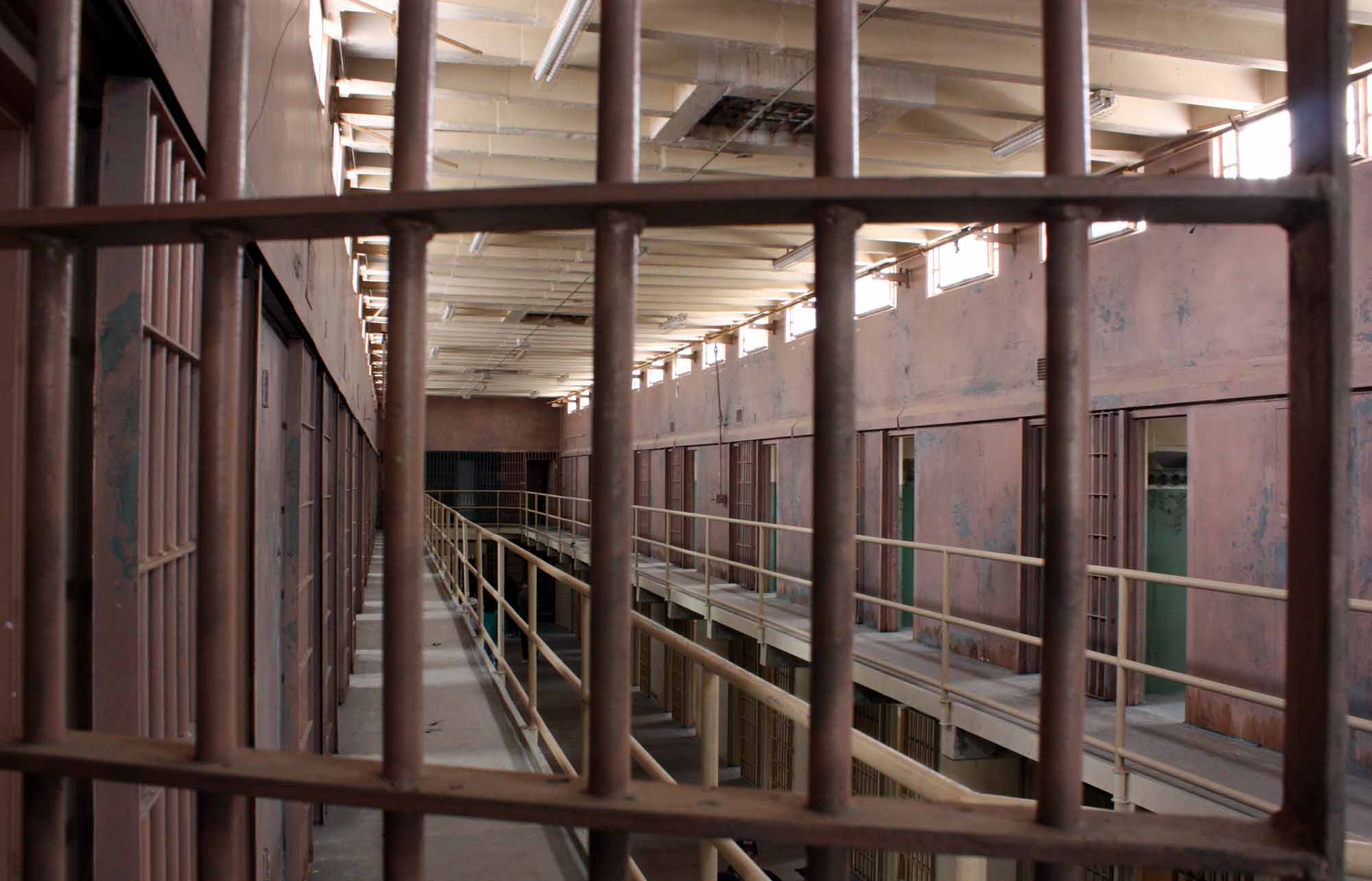
High-Profile Cases
Serial Killer Bruce McArthur Sentenced to Life in Prison
After pleading guilty to eight counts of first-degree murder, Bruce McArthur was sentenced to life in prison with no chance of parole for 25 years. The 67-year-old former landscaper took his victims from Toronto’s gay village, dismembered them and hid the remains in yards and planter boxes owned by his clients.
-
February 08, 2019

High-Profile Cases
Quebec City Mosque Shooter Sentenced to Life in Prison
Alexandre Bissonnette, who shot and killed six men at a mosque in Quebec City on 29 January 2017, was sentenced to life in prison with no chance of parole for 40 years.
-
February 12, 2019

High-Profile Cases
Ontario Police Free 43 People from Human Trafficking Ring
Forty-three Mexican men aged 20 to 46, who had paid traffickers to bring them to Canada so they could seek education and employment opportunities, were forced to work as hotel cleaners in Collingwood, Innisfil, Oro-Medonte and Cornwallfor less than $50 a month. The traffickers were not arrested or charged with any crimes. The victims were all offered employment and lodging at a local resort.
-
February 12, 2019

High-Profile Cases
Ontario and Saskatchewan in Court Over Carbon Tax
The province of Saskatchewan argued to the Saskatchewan Court of Appeals that the federal governmentshould not be able to impose a carbon tax on unwilling provinces, which also include Ontarioand New Brunswick. Representatives for the federal government argued that it is a “regulatory charge,” not a tax, and that carbon emissions fall within federal jurisdiction because they are a matter of “national concern.”
-
January 13, 2020
Legislation
Ottawa Begins Public Consultations on MAID Law
In response to a Superior Court of Quebec ruling in September 2019 that it is unconstitutional to limit medical assistance in dying (MAID) to people facing a “reasonably foreseeable” natural death, the Trudeau government began a two-week consultation period to determine the new stipulations of the law. It had until 11 March 2020 to amend the legislation.
-
January 15, 2020
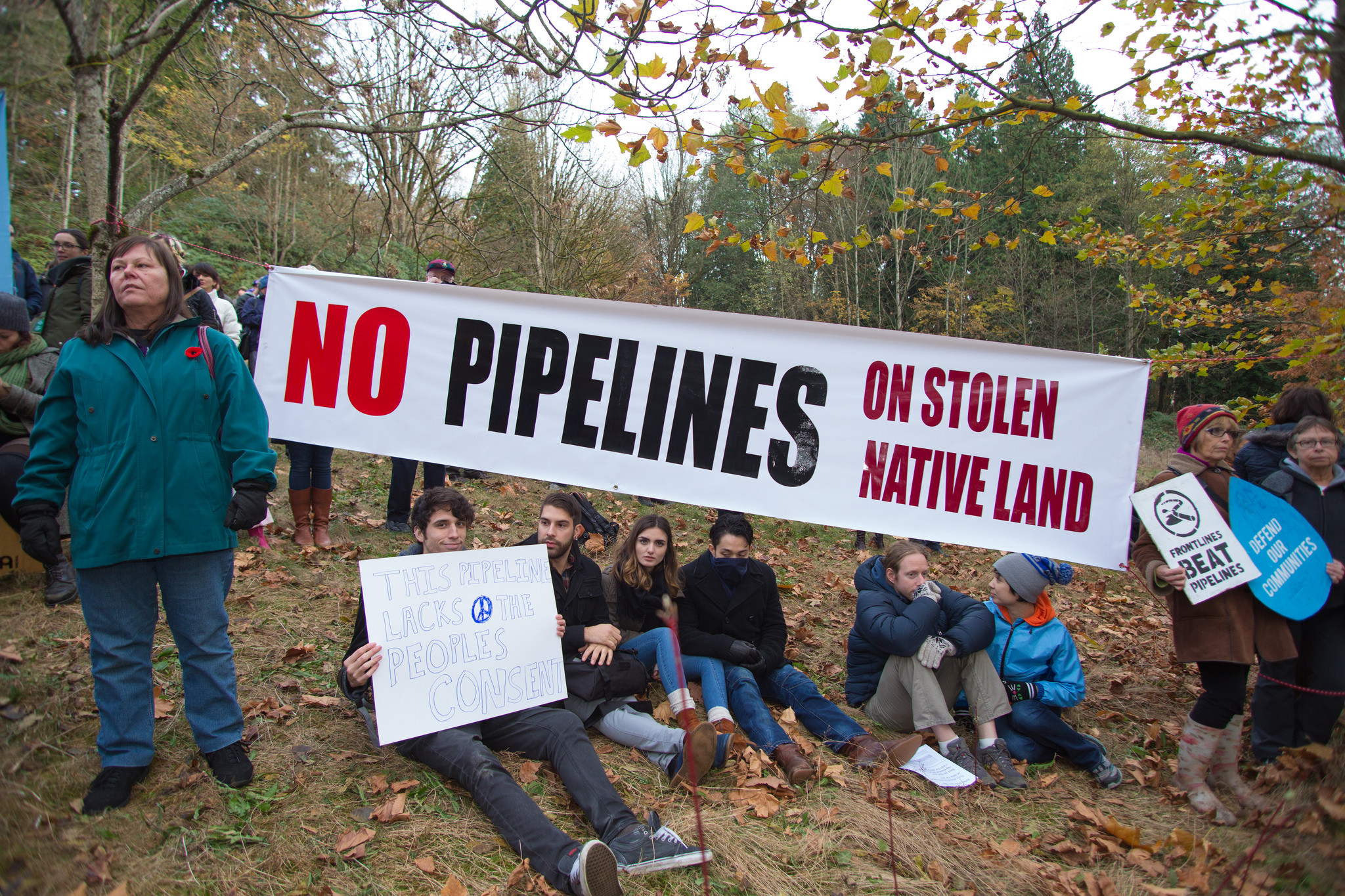
Indigenous Peoples
Wet'suwet'en First Nation Protests Against Trans Mountain Pipeline
Environmental activists held protests on Vancouver Island and at the Toronto office of Deputy Prime Minister Chrystia Freeland, calling for the federal government to stop construction of the Coastal GasLink pipeline through the Wet'suwet'en First Nation territory in British Columbia. Coastal GasLink had obtained approval from the elected councils of 20 First Nations, but hereditary clan leaders refused to consent to the pipeline and demanded that it not proceed.
-
January 16, 2020

High-Profile Cases Supreme Court of Canada
Supreme Court Dismisses BC’s Appeal of Trans Mountain Expansion
The BC government had asked the Supreme Court of Canada whether the province has jurisdiction over the expansion of the Trans Mountain pipeline from Alberta. The court ruled unanimously that it falls within federal jurisdiction.
-
January 20, 2020

High-Profile Cases
Meng Wanzhou Hearing Begins
The extradition hearing for Huawei executive Meng Wanzhou began in Vancouver. She was arrested by the RCMP in December 2018 at the request of US officials, on the grounds that she had violated US sanctions against Iran. In retaliation, the Chinese government detained two Canadian citizens — Michael Kovrig and Michael Spavor — in China.
-
June 17, 2021

People Supreme Court of Canada
Mahmud Jamal Becomes First Racialized Person on Supreme Court of Canada
Mahmud Jamal became the first racialized person and the first South Asian Canadian to be appointed as a justice to the Supreme Court of Canada. A former Fulbright scholar with a background in law and economics, Jamal worked as a litigator before becoming a judge with the Court of Appeal for Ontario. He replaced justice Rosalie Abella and began serving on the Supreme Court on 1 July 2021.
-
July 01, 2021
People Supreme Court of Canada
First South Asian Canadian to Sit on Supreme Court
Mahmud Jamal became the first racialized person and the first South Asian Canadian to serve as a justice on the Supreme Court of Canada. A former Fulbright scholar with a background in law and economics, Jamal worked as a litigator with the Toronto firm Osler, Hoskin & Harcourt LLP before becoming a judge with the Court of Appeal for Ontario.
-
October 03, 2021
High-Profile Cases
Pandora Papers Reveal Canada Is “A Hub” of Global Tax Avoidance Scheme, Watchdog Says
Following the release of the Panama Papers and the Paradise Papers, the International Consortium of Investigative Journalists released its findings on the Pandora Papers, a collection of 12 million documents from 14 offshore financial institutions. James Cohen of Transparency International said the papers show that "Canada is a hub" of illicit financial flows and offshore called for the creation of a public registry for corporate beneficial ownership. The governing Liberal Party had announced in its 2021 federal budget that such a registry would be created by 2025.
-
November 29, 2021
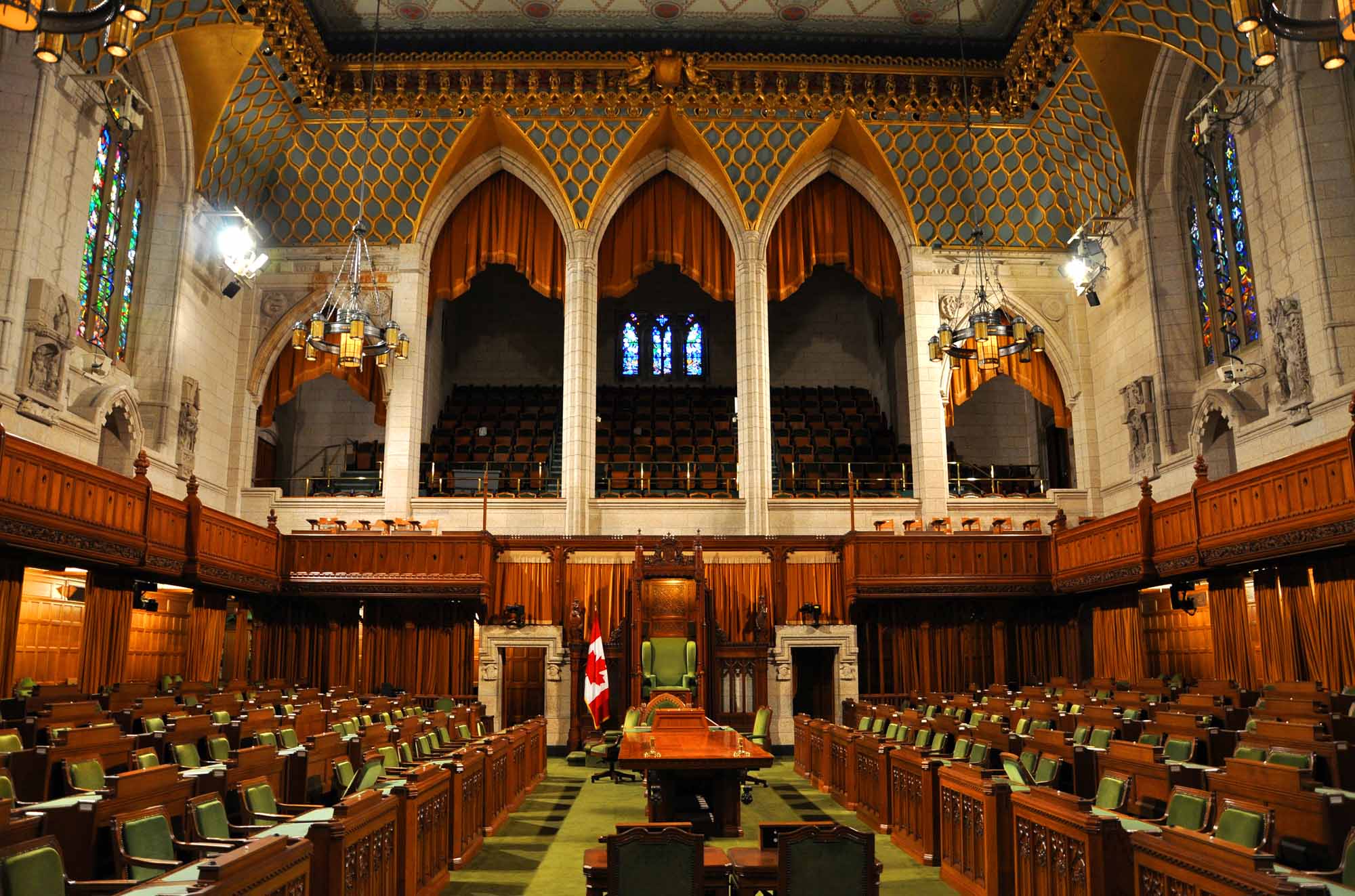
Legislation The Law
Federal Government Tables Bill to Ban Conversion Therapy
After promising to reintroduce legislation banning conversion therapy in Canada within the first 100 days of its new mandate, the minority Liberal government of Justin Trudeau tabled Bill C-4. It included a broader definition of what constituted conversion therapy — also known as the ex-gay movement — as well as the addition of four new offenses to the Criminal Code. If passed, the legislation would make it illegal to force anyone to undergo conversion therapy, punishable by up to five years in prison. It would also allow courts to order the seizure or removal of conversion therapy advertisements.





